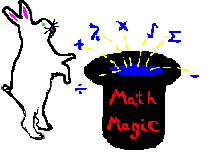 |
||
| HOME
Miscellaneous Elementary Junior High Sum Of Positive Integral Divisors High School Manipulating Polygonal Numbers
|
Sum Of The Positive Integral Divisors:A. To find the sum of the positive integral divisors you first need to know the information in Positive Integral Divisors. B. This method takes a lot of practice but is worthwhile. For small numbers, you might be able to add all the positive integral divisors together, but for more complex numbers, this is more difficult. 1. The sum of the positive integral divisors means all the numbers that can divide into the number evenly, added together. Ex [1] Find the sum of the positive integral divisors of 12. a. The divisors are: 1, 2, 3, 4, 6, and 12. b. Their sum is 28. C. Below are the steps to solving the sum of the positive integral divisors: 1. First, find the exponential prime factorization of the number. 2. If the exponent is 1, then add one to the number. 3. If the exponent is greater than 1, then use the following: (ne+1 - 1) / (n - 1), where n is the number and e is the exponent 4. Multiply all the numbers together. Ex [1] Find the sum of the positive integral divisors of 12. a. The prime factorization of 12 is: 22 x 31. b. The first exponent is greater than 1, so using the formula we get: (22+1 - 1)/(2-1) or 7. c. The second exponent is 1, so we add one to 3 to get 4. d. Multiplying these together we get: 4 x 7 or 28. e. The answer is 28. Ex [2] Find the sum of the positive integral divisors of 45. a. The prime factorization of 45 is: 32 x 51. b. The first exponent is greater than 1, so using the formula we get: (32+1 - 1)/(3-1) or 26/2 or 13. c. The second exponent is 1, so we add one to 5 to get 6. d. Multiplying these together we get: 13 x 6 or 78. e. The answer is 78.
|
